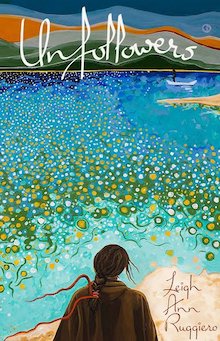Our Research Notes series invites authors to describe their process for a recent book, with “research” defined as broadly as they like. This week, Leigh Ann Ruggiero writes about Unfollowers, winner of the Juniper Prize for Fiction from University of Massachusetts Press.
+
 The foundation of writing is research: having the proverbial notebook at the ready, seeking truth in the lines of tomes, observing the experiences of ourselves and others.
The foundation of writing is research: having the proverbial notebook at the ready, seeking truth in the lines of tomes, observing the experiences of ourselves and others.
In To Know as We Are Known, Parker Palmer argues that knowledge may come from three places. The first two are curiosity and control. These sources, Parker claims, are inadequate in and of themselves because they isolate rather than unify.
Only the third source, love, bands us together. Only love helps us heal.
+
Unfollowers is about missionaries, cultural displacement, and what the novel’s blurb calls “religious angst.” The narrative travels from rural to urban Ethiopia, from western Pennsylvania to Stockholm, from suburban Atlanta to Washington, D.C.
But my research started with a scrap of receipt paper from a Borders Café at a mall in White Flint, Maryland.
The scrap is from sixteen years ago, back when Borders and malls were still popular. I rode the Metro forty minutes to open the store with Berhanu, my fellow barista who loved chatting about the 2006 World Cup.
I didn’t know much about soccer beyond my own short tenure as a fullback in a YMCA youth league, but Berhanu waxed eloquent about France and Germany in the semifinals and ranted against Italy when they took home the cup.
Berhanu hated the way Italy played. They packed in the defense and turned the world’s most beautiful game ugly. I’m second-generation Italian American on my dad’s side, but Berhanu’s critique averted my becoming a fan.
Berhanu didn’t mention the Italian occupation of Ethiopia, where he grew up, but I sensed an underlying tension.
Sometimes he sang as we prepped the pastry case and espresso machine. When I asked what he was singing, he gratified my interest, writing the name of the song in Amharic.
It was my first encounter with the language, but it wouldn’t be my last.
+
Upon further reflection, my research started not at a Borders in 2006 but on a mission trip to New York City three years prior. Although our avowed intention was to help those in need, we spent most of our time accosting people in the street.
I’d always disliked such trips. The mandate to spread God’s word paralyzed me with doubt. I couldn’t help but witness the oppressive systems around us, the confidence with which we Christians approached the have-nots, certain that we and not they had been chosen.
I could love these strangers but doubted that convincing them to accept Jesus would be enough to heal them.
Though not everyone on these trips was white, volunteer missionaries in the United States are, by and large (70.8% in 2018). The same is true of international missionaries (only 10% of Southern Baptist missionaries working abroad in 2016 were people of color). Statistics like these only raise more doubts about the relationship between missionaries and their converts, doubts previously explored by Lorraine Hansberry in Les Blancs, Chinua Achebe in Things Fall Apart, Barbara Kingsolver in The Poisonwood Bible, Chimamanda Ngozi Adichie in The Purple Hibiscus, and others.
Visiting New York City to share the good news felt almost as useless as sending missionaries to Ethiopia, one of the first places organized Christianity gained a foothold, a fact in which Berhanu took great pride.
I couldn’t shake the conviction that these trips were more for our benefit than for the benefit of prospective converts.
+
In 2008 I left the evangelical faith. But the past fourteen years have taught me that though a person may leave the faith, the faith may not necessarily leave a person.
In 2009 I wrote a paragraph that wouldn’t leave me either: a pastor’s wife smoking cigarettes on a church roof while ruminating about an affair. The scene appears at the end of Unfollowers’ first act.
I realized this pastor’s wife felt alienated in western Pennsylvania. She needed to go home but didn’t know where that was — rural Ethiopia, perhaps, where she had been raised by missionary parents.
I soon discovered Ruth Van Reken’s work on children raised in cultures outside of their home country. The more I read about such children, whom Van Reken calls Third Culture Kids, the harder it was to ignore the parallels between them and me. I, too, experienced a delayed rebellion. I, too, felt a detachment from the world around me, though mine was born of spiritual abuse rather than cultural displacement.
I felt an unexpected nudge: love starting to grow.
This is it, I thought, the story that will help me heal.
+++